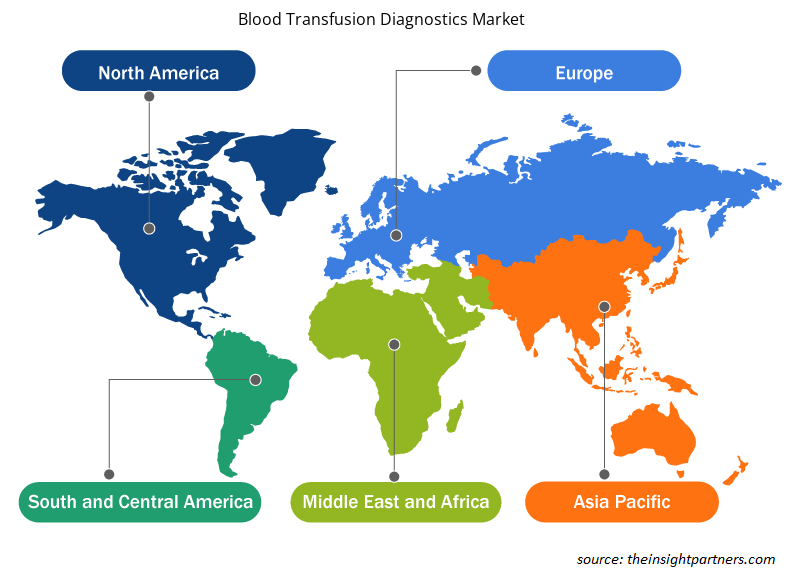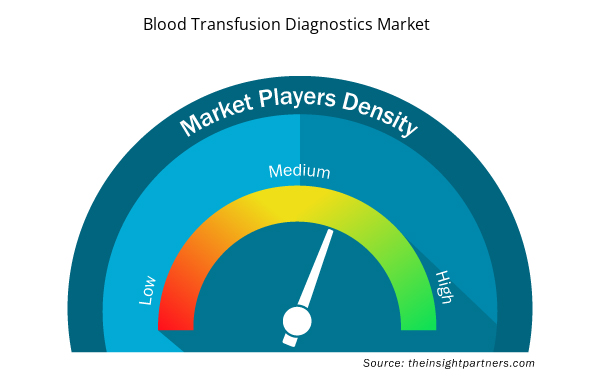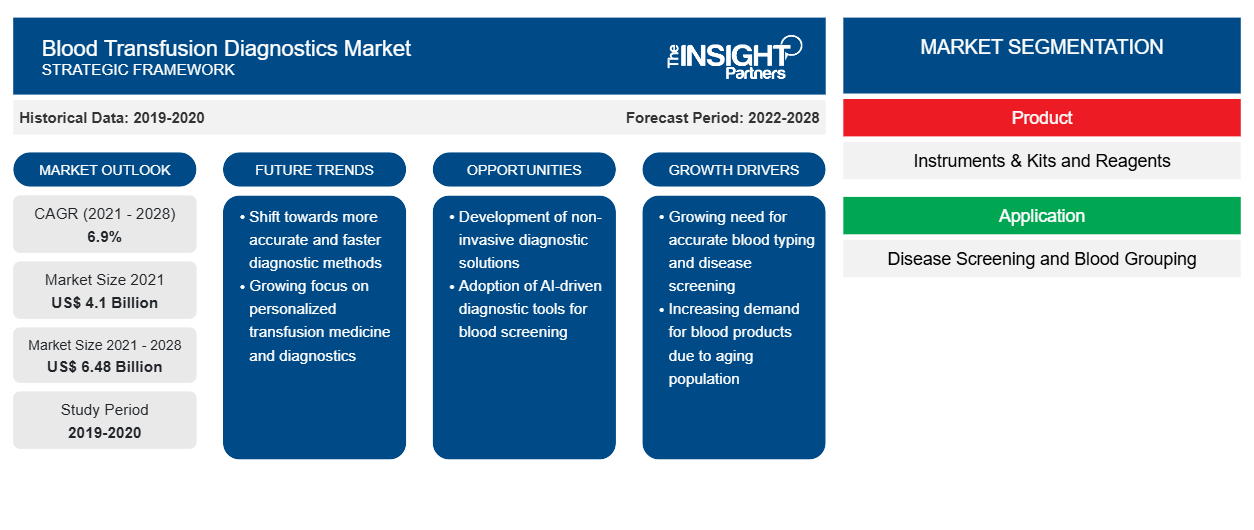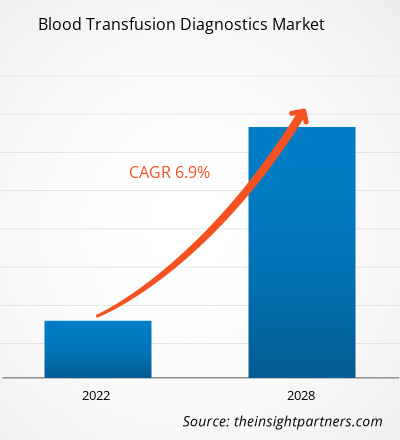[Forschungsbericht] Der Markt für Bluttransfusionsdiagnostik soll von 4.096,93 Millionen US-Dollar im Jahr 2021 auf 6.483,75 Millionen US-Dollar im Jahr 2028 wachsen. Von 2022 bis 2028 wird mit einer durchschnittlichen jährlichen Wachstumsrate von 6,9 % gerechnet.
Bei der Bluttransfusionsdiagnostik werden Blutuntersuchungen durchgeführt, bevor es Patienten übertragen wird. Eine Bluttransfusion ist ein gängiges Verfahren, bei dem das gespendete Blut oder seine Bestandteile intravenös in den Körper des Patienten übertragen werden. Jede Bluteinheit muss einer Blutgruppenbestimmung unterzogen werden, bei der die Blutgruppe bestimmt wird und Blutuntersuchungen durchgeführt werden, einschließlich Krankheitserkennungstests, um Nebenwirkungen oder die Übertragung von Infektionen zu vermeiden.
Der Bericht bietet Einblicke und eine eingehende Analyse des globalen Marktes für Bluttransfusionsdiagnostik und hebt verschiedene Parameter hervor, darunter Markttrends, technologische Fortschritte, Marktdynamik und eine Analyse der Wettbewerbslandschaft der weltweit führenden Marktakteure. Er umfasst auch die Auswirkungen der COVID-19-Pandemie auf den Markt in allen Regionen. Die COVID-19-Pandemie hatte negative Auswirkungen auf das Wachstum des globalen Marktes für Bluttransfusionsdiagnostik. Sie führte zu einem enormen Umsatzrückgang aufgrund der strengen Beschränkungen durch die Regierung, die zu einer Verringerung der Anzahl durchgeführter chirurgischer Eingriffe führten. Diese Dienste werden hauptsächlich bei Operationen mit hohem Blutverlust genutzt, wie etwa orthopädischen und Herzoperationen. Aufgrund der sinkenden Anzahl durchgeführter Operationen ist die Nachfrage nach Bluttransfusionen gesunken. Zum Beispiel: Laut den von der American Medical Association veröffentlichten Daten wurde die Gesamtzahl der in den USA durchgeführten chirurgischen Eingriffe aufgrund der COVID-19-Pandemie auf schätzungsweise 48 % reduziert. Nachdem sich die Beschränkungen aufgrund der Pandemie normalisiert hatten, normalisierte sich die Anzahl der chirurgischen Eingriffe jedoch wieder.
Passen Sie diesen Bericht Ihren Anforderungen an
Sie erhalten kostenlos individuelle Anpassungen an jedem Bericht, einschließlich Teilen dieses Berichts oder einer Analyse auf Länderebene, eines Excel-Datenpakets sowie tolle Angebote und Rabatte für Start-ups und Universitäten.
- Holen Sie sich die wichtigsten Markttrends aus diesem Bericht.Dieses KOSTENLOSE Beispiel umfasst eine Datenanalyse von Markttrends bis hin zu Schätzungen und Prognosen.
Geographiebasierte Erkenntnisse
Geografisch ist der globale Markt für Bluttransfusionsdiagnostik in Nordamerika (USA, Kanada und Mexiko), Europa (Frankreich, Deutschland, Großbritannien, Spanien, Italien und das übrige Europa), den asiatisch-pazifischen Raum (China, Indien, Japan, Australien, Südkorea und den Rest des asiatisch-pazifischen Raums), den Nahen Osten und Afrika (Saudi-Arabien, die Vereinigten Arabischen Emirate, Südafrika und den Rest des Nahen Ostens) sowie Süd- und Mittelamerika (Brasilien, Argentinien und den Rest Süd- und Mittelamerikas) unterteilt.
Markteinblicke
Bedarf an Bluttransfusionen aufgrund der Zunahme von Organtransplantationen
Eine Organtransplantation ist ein chirurgischer Eingriff, der bei Organversagen durchgeführt wird. Normalerweise werden Organtransplantationen für Herz, Leber, Niere und verschiedene andere Organe durchgeführt, da immer mehr Fälle chronischer Krankheiten wie chronische Nierenerkrankung (CKD), polyzystische Nierenerkrankung, Mukoviszidose und angeborene Herzfehler auftreten, die Transplantationen erfordern. Diese Verfahren dauern in der Regel Stunden, es kommt zu hohem Blutverlust und es sind Bluttransfusionen erforderlich. Laut dem United Network for Organ Sharing (UNOS) beispielsweise haben die in den USA durchgeführten Organtransplantationen kontinuierlich zugenommen. Im Jahr 2021 wurden dort über 41.000 Transplantationen durchgeführt. Ebenso entfielen laut Daten des World Transplant Registry im Jahr 2019 20 % aller Organspenden in Europa auf Spanien und 6 % weltweit. Die Organspenderrate in Australien hat sich in letzter Zeit verbessert und stieg im Jahr 2019 auf 21,8 Spender pro Million Einwohner.
Kanada hat ebenfalls 22,2 Spender pro Million Einwohner und verbessert sich stetig, was teilweise auf die Zahl der „Spendeärzte“ zurückzuführen ist – Intensivmediziner, die für Organspenden verantwortlich sind. Laut dem Welttransplantationsregister hatte China im Jahr 2019 5.818 Spender oder 4,1 pro Million Einwohner und Indien hatte 715 Spender oder 0,5 pro Million Einwohner im Jahr 2019. Russland hatte dagegen eine etwas höhere Rate von 5,1 Spendern pro Million Menschen. Die öffentlich-private Partnerschaft in Zusammenarbeit mit Transplantationskoordinatoren hat erheblich zur Verbesserung von Organtransplantationen beigetragen, die ständige Bluttransfusionen erfordern. Sowohl Entwicklungs- als auch Industrieländer haben einen Anstieg der Organtransplantationsoperationen erlebt. Beispielsweise entwickeln sich Entwicklungsländer wie Indien und Singapur zu Zielen für den Medizintourismus im asiatisch-pazifischen Raum. Die Länder machen Fortschritte bei der Bereitstellung besserer und fortschrittlicherer medizinischer Behandlungen. Der steigende Bedarf an Organtransplantationen ist einer der Hauptfaktoren, die die Nachfrage nach Bluttransfusionsdiagnostik weltweit antreiben.
Produktbasierte Einblicke
Basierend auf dem Produkt ist der globale Markt für Bluttransfusionsdiagnostik in Instrumente & Kits und Reagenzien unterteilt. Im Jahr 2021 hatte das Segment Instrumente & Kits einen größeren Marktanteil. Es wird erwartet, dass dasselbe Segment von 2022 bis 2028 eine höhere CAGR auf dem Markt verzeichnet.
Anwendungsbasierte Erkenntnisse
Basierend auf der Anwendung ist der globale Markt für Bluttransfusionsdiagnostik in Krankheitsscreening und Blutgruppenbestimmung unterteilt. Das Segment Krankheitsscreening hatte 2021 einen größeren Marktanteil und wird im Prognosezeitraum voraussichtlich eine höhere CAGR verzeichnen.
Regionale Einblicke in den Markt für Bluttransfusionsdiagnostik
Die regionalen Trends und Faktoren, die den Markt für Bluttransfusionsdiagnostik im Prognosezeitraum beeinflussen, wurden von den Analysten von Insight Partners ausführlich erläutert. In diesem Abschnitt werden auch die Marktsegmente und die Geografie der Bluttransfusionsdiagnostik in Nordamerika, Europa, im asiatisch-pazifischen Raum, im Nahen Osten und Afrika sowie in Süd- und Mittelamerika erörtert.

- Erhalten Sie regionale Daten zum Markt für Bluttransfusionsdiagnostik
Umfang des Marktberichts zur Bluttransfusionsdiagnostik
| Berichtsattribut | Details |
|---|---|
| Marktgröße im Jahr 2021 | 4,1 Milliarden US-Dollar |
| Marktgröße bis 2028 | 6,48 Milliarden US-Dollar |
| Globale CAGR (2021 - 2028) | 6,9 % |
| Historische Daten | 2019-2020 |
| Prognosezeitraum | 2022–2028 |
| Abgedeckte Segmente | Nach Produkt
|
| Abgedeckte Regionen und Länder | Nordamerika
|
| Marktführer und wichtige Unternehmensprofile |
|
Marktteilnehmerdichte im Bereich Bluttransfusionsdiagnostik: Auswirkungen auf die Geschäftsdynamik verstehen
Der Markt für Bluttransfusionsdiagnostik wächst rasant, angetrieben durch die steigende Nachfrage der Endnutzer aufgrund von Faktoren wie sich entwickelnden Verbraucherpräferenzen, technologischen Fortschritten und einem größeren Bewusstsein für die Vorteile des Produkts. Mit steigender Nachfrage erweitern Unternehmen ihr Angebot, entwickeln Innovationen, um die Bedürfnisse der Verbraucher zu erfüllen, und nutzen neue Trends, was das Marktwachstum weiter ankurbelt.
Die Marktteilnehmerdichte bezieht sich auf die Verteilung der Firmen oder Unternehmen, die in einem bestimmten Markt oder einer bestimmten Branche tätig sind. Sie gibt an, wie viele Wettbewerber (Marktteilnehmer) in einem bestimmten Marktraum im Verhältnis zu seiner Größe oder seinem gesamten Marktwert präsent sind.
Die wichtigsten auf dem Markt für Bluttransfusionsdiagnostik tätigen Unternehmen sind:
- Grifols, SA
- F. Hoffmann-La Roche Ltd
- Immucor, Inc.
- Bio-Rad Laboratories Inc.
- Abbott
Haftungsausschluss : Die oben aufgeführten Unternehmen sind nicht in einer bestimmten Reihenfolge aufgeführt.

- Überblick über die wichtigsten Akteure auf dem Markt für Bluttransfusionsdiagnostik
Endbenutzerbasierte Erkenntnisse
Basierend auf dem Endverbraucher ist der globale Markt für Bluttransfusionsdiagnostik in Blutbanken, Krankenhäuser, Diagnoselabore und Plasmafraktionierungsunternehmen unterteilt . Das Segment Blutbanken hatte 2021 den größten Marktanteil. Es wird erwartet, dass dasselbe Segment von 2022 bis 2028 die höchste durchschnittliche jährliche Wachstumsrate auf dem Markt verzeichnet.
Die Akteure auf dem globalen Markt für Bluttransfusionsdiagnostik verfolgen organische Strategien, einschließlich Produkteinführung und -erweiterung, um ihre Präsenz und ihr Produktportfolio weltweit zu erweitern und die steigende Nachfrage zu decken. Die wichtigsten Akteure auf dem Markt sind Grifols, SA; F. Hoffmann-La Roche Ltd; Immucor, Inc.; Bio-Rad Laboratories, Inc.; Abbott; Thermo Fisher Scientific Inc.; Ortho Clinical Diagnostics; DiaSorin SpA; Quotient Limited; und BAG Diagnostics GmbH.
- Historische Analyse (2 Jahre), Basisjahr, Prognose (7 Jahre) mit CAGR
- PEST- und SWOT-Analyse
- Marktgröße Wert/Volumen – Global, Regional, Land
- Branche und Wettbewerbsumfeld
- Excel-Datensatz



Report Coverage
Revenue forecast, Company Analysis, Industry landscape, Growth factors, and Trends

Segment Covered
This text is related
to segments covered.

Regional Scope
North America, Europe, Asia Pacific, Middle East & Africa, South & Central America

Country Scope
This text is related
to country scope.
Häufig gestellte Fragen
Global blood transfusion diagnostics market is segmented by region into North America, Europe, Asia Pacific, Middle East & Africa, and South & Central America. In North America, the U.S. is the largest market for blood transfusion diagnostics market. The growth of the market in North America is expected due to the factors such as increasing surgical procedures for chronic health conditions, rising collaborative agreements between key players, and growing progress in the health system for blood transfusion diagnostics. However, the improvement in blood transfusion management, increasing prevalence of sepsis and thalassemia, and the introduction of advanced molecular platforms are the key factor responsible for the Asia-Pacific regional growth for blood transfusion diagnostics accounting fastest growth of the region during the coming years.
Grifols, S.A.; F. Hoffmann-La Roche Ltd; DiaSorin S.p.A.; BAG Diagnostics GmbH; Abbott; Bio-Rad Laboratories, Inc.; Immucor, Inc.; Thermo Fisher Scientific Inc.; Ortho Clinical Diagnostics; and Quotient Limited are among the leading companies operating in the blood transfusion diagnostics market.
The blood banks segment dominated the global blood transfusion diagnostics market and accounted for the largest market share of 40.23% in 2021.
Based on application, disease screening segment took the forefront lead in the worldwide market by accounting largest share in 2021 and is expected to continue to do so till the forecast period.
Based on products, instruments and kits segment took the forefront lead in the worldwide market by accounting largest share in 2021 and is expected to continue to do so till the forecast period.
Blood transfusion diagnostics refers to tests performed on blood and blood components before they are transfused to patients. A blood transfusion is a common procedure in which donated blood or blood components are transfused into the patient's body through an intravenous line (IV). Each unit of blood must undergo blood typing, which refers to the identification of blood type and blood screening, including disease detection tests to avoid side effects or transmission of infection. Blood screening before transfusion is performed through instruments, kits, and reagents to identify various diseases, such as HIV, hepatitis B, hepatitis C, Zika, and different viruses and infections.
Rapid increase in chronic diseases and increasing need for blood transfusion due to rise in organ transplants surgeries are the most significant factors responsible for the overall market growth.
Trends and growth analysis reports related to Life Sciences : READ MORE..
The List of Companies - Blood Transfusion Diagnostics Market
- Grifols, S.A.
- F. Hoffmann-La Roche Ltd
- Immucor, Inc.
- Bio-Rad Laboratories Inc.
- Abbott
- Thermo Fisher Scientific Inc.
- Ortho Clinical Diagnostics
- DiaSorin S.p.A.
- Quotient Limited
- BAG Diagnostics GmbH
The Insight Partners performs research in 4 major stages: Data Collection & Secondary Research, Primary Research, Data Analysis and Data Triangulation & Final Review.
- Data Collection and Secondary Research:
As a market research and consulting firm operating from a decade, we have published and advised several client across the globe. First step for any study will start with an assessment of currently available data and insights from existing reports. Further, historical and current market information is collected from Investor Presentations, Annual Reports, SEC Filings, etc., and other information related to company’s performance and market positioning are gathered from Paid Databases (Factiva, Hoovers, and Reuters) and various other publications available in public domain.
Several associations trade associates, technical forums, institutes, societies and organization are accessed to gain technical as well as market related insights through their publications such as research papers, blogs and press releases related to the studies are referred to get cues about the market. Further, white papers, journals, magazines, and other news articles published in last 3 years are scrutinized and analyzed to understand the current market trends.
- Primary Research:
The primarily interview analysis comprise of data obtained from industry participants interview and answers to survey questions gathered by in-house primary team.
For primary research, interviews are conducted with industry experts/CEOs/Marketing Managers/VPs/Subject Matter Experts from both demand and supply side to get a 360-degree view of the market. The primary team conducts several interviews based on the complexity of the markets to understand the various market trends and dynamics which makes research more credible and precise.
A typical research interview fulfils the following functions:
- Provides first-hand information on the market size, market trends, growth trends, competitive landscape, and outlook
- Validates and strengthens in-house secondary research findings
- Develops the analysis team’s expertise and market understanding
Primary research involves email interactions and telephone interviews for each market, category, segment, and sub-segment across geographies. The participants who typically take part in such a process include, but are not limited to:
- Industry participants: VPs, business development managers, market intelligence managers and national sales managers
- Outside experts: Valuation experts, research analysts and key opinion leaders specializing in the electronics and semiconductor industry.
Below is the breakup of our primary respondents by company, designation, and region:

Once we receive the confirmation from primary research sources or primary respondents, we finalize the base year market estimation and forecast the data as per the macroeconomic and microeconomic factors assessed during data collection.
- Data Analysis:
Once data is validated through both secondary as well as primary respondents, we finalize the market estimations by hypothesis formulation and factor analysis at regional and country level.
- Macro-Economic Factor Analysis:
We analyse macroeconomic indicators such the gross domestic product (GDP), increase in the demand for goods and services across industries, technological advancement, regional economic growth, governmental policies, the influence of COVID-19, PEST analysis, and other aspects. This analysis aids in setting benchmarks for various nations/regions and approximating market splits. Additionally, the general trend of the aforementioned components aid in determining the market's development possibilities.
- Country Level Data:
Various factors that are especially aligned to the country are taken into account to determine the market size for a certain area and country, including the presence of vendors, such as headquarters and offices, the country's GDP, demand patterns, and industry growth. To comprehend the market dynamics for the nation, a number of growth variables, inhibitors, application areas, and current market trends are researched. The aforementioned elements aid in determining the country's overall market's growth potential.
- Company Profile:
The “Table of Contents” is formulated by listing and analyzing more than 25 - 30 companies operating in the market ecosystem across geographies. However, we profile only 10 companies as a standard practice in our syndicate reports. These 10 companies comprise leading, emerging, and regional players. Nonetheless, our analysis is not restricted to the 10 listed companies, we also analyze other companies present in the market to develop a holistic view and understand the prevailing trends. The “Company Profiles” section in the report covers key facts, business description, products & services, financial information, SWOT analysis, and key developments. The financial information presented is extracted from the annual reports and official documents of the publicly listed companies. Upon collecting the information for the sections of respective companies, we verify them via various primary sources and then compile the data in respective company profiles. The company level information helps us in deriving the base number as well as in forecasting the market size.
- Developing Base Number:
Aggregation of sales statistics (2020-2022) and macro-economic factor, and other secondary and primary research insights are utilized to arrive at base number and related market shares for 2022. The data gaps are identified in this step and relevant market data is analyzed, collected from paid primary interviews or databases. On finalizing the base year market size, forecasts are developed on the basis of macro-economic, industry and market growth factors and company level analysis.
- Data Triangulation and Final Review:
The market findings and base year market size calculations are validated from supply as well as demand side. Demand side validations are based on macro-economic factor analysis and benchmarks for respective regions and countries. In case of supply side validations, revenues of major companies are estimated (in case not available) based on industry benchmark, approximate number of employees, product portfolio, and primary interviews revenues are gathered. Further revenue from target product/service segment is assessed to avoid overshooting of market statistics. In case of heavy deviations between supply and demand side values, all thes steps are repeated to achieve synchronization.
We follow an iterative model, wherein we share our research findings with Subject Matter Experts (SME’s) and Key Opinion Leaders (KOLs) until consensus view of the market is not formulated – this model negates any drastic deviation in the opinions of experts. Only validated and universally acceptable research findings are quoted in our reports.
We have important check points that we use to validate our research findings – which we call – data triangulation, where we validate the information, we generate from secondary sources with primary interviews and then we re-validate with our internal data bases and Subject matter experts. This comprehensive model enables us to deliver high quality, reliable data in shortest possible time.


 Holen Sie sich ein kostenloses Muster für diesen Bericht
Holen Sie sich ein kostenloses Muster für diesen Bericht